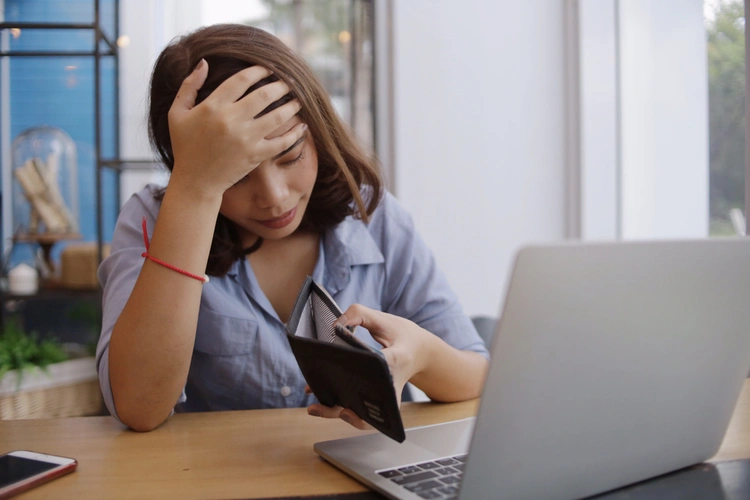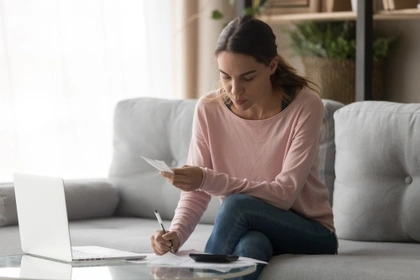What is bankruptcy?
Bankruptcy is a legal status for those who are unable to repay what they owe. Typically, this option is for those who owe more than the total value of their assets. You can only declare bankruptcy if you have over £5,000 of debt.
Once you declare bankruptcy, your assets, like your house, car, or jewellery, are sold off to pay creditors. The bankruptcy period lasts 12 months, and you’ll have to follow restrictions during this time – one of which is you’ll be unable to borrow more than £500.
You may also have to make payments toward your debt for up to three years, depending on your level of income.
After being discharged from bankruptcy, most of your debts will be written off, depending on the terms of your arrangement. Certain debts, like student loans or child support payments, would still be owed.
Bankruptcy is generally a last resort – a Debt Relief Order (DRO) or Individual Voluntary Agreement (IVA) may be more suitable for less severe cases.
How going bankrupt affects your credit
You might find it hard to get a credit card, as lenders may see you as high risk. Your bankruptcy will likely stay on your credit report for at least six years and financial companies may be concerned about lending you money in case they don’t get it back.
Can I get credit while bankrupt?
If you apply for credit during your bankruptcy, you must disclose your status to the lender if you plan to borrow more than £500. This applies to all types of credit, whether that’s a credit card, loan or overdraft.
The lender will check your income and outgoings, including payments toward your bankruptcy, and determine your eligibility. A bankruptcy order also tells lenders that you’ve struggled with borrowing in the past, which could make them more cautious about lending to you.
This means if you’re bankrupt and you’re trying to borrow more than £500, it’s unlikely you’ll be accepted.
For this reason, it’s best not to apply for credit while bankrupt – a rejected application could harm your credit history further. Plus, multiple applications made within 3-6 months can give lenders the impression that you are desperate for cash.
TOP TIP: You can check your credit report for free to get insight into how lenders see you. Go through the three main credit reference agencies in the UK (Equifax, Experian, and TransUnion), or through our free app, CredAbility.
Do I need to disclose my bankruptcy if I'm borrowing less than £500?
If you’re borrowing less than £500, you should still disclose your bankruptcy to your lender. It isn’t a legal requirement to disclose, but you may be asked about bankruptcy during the application. Your bankruptcy order will also appear in their credit history checks.
Can I apply for credit after being discharged from bankruptcy?
Although you’re free to borrow once you’re discharged, you may still find it difficult to do so. Typically, a bankruptcy order lasts for 12 months, but it will stay on your credit record for at least six years.
The credit cards you’re eligible for may have higher interest rates and lower credit limits.
Before you apply for credit, work out what the monthly payments are likely to be and whether you can afford them.
The more time since the bankruptcy was discharged, the easier it should become for you to get credit – if you’ve been responsible with money since.
What credit options are available after I’ve been bankrupt?
If you want to apply for a credit card after being discharged from bankruptcy, there are options available to you, like a credit builder card or a prepaid card. These can help rebuild your credit score if you use them responsibly.
| Aspect | Credit Builder Card | Prepaid Card |
| Builds credit history | ✓ Responsible use can help build a positive credit history. | ✗ Does not impact credit history as no credit is extended. |
| Flexibility | ✓ Flexible monthly repayment options. | ✗ Restricted to the preloaded amount with no flexibility beyond that. |
| Payment protection | ✓ Offers payment protection on purchases between £100-30,000 via Section 75 | ✗ Limited protection via chargebacks. |
| Credit check | ✗ Requires a credit check; approval based on credit history. | ✓ No credit check required. |
| Interest rates | ✗ Charges interest on outstanding balances if not paid in full monthly. | ✓ No interest charges, as you spend your own money. |
| Debt risk | ✗ Potential to accumulate debt if not paid off each month. | ✓ No risk of debt since you can't spend more than the preloaded amount. |
| Fees | ✗ May have annual fees, late payment fees, and cash advance fees. | ✗ May have activation fees, inactivity fees, and ATM withdrawal fees. |
Credit builder cards
A credit builder card is a credit card designed for people who have a bad or thin credit history. It works like a normal credit card but often has a lower credit limit.
If you have been discharged from bankruptcy, you can use a credit builder card to help you access better finance options in the future and improve your credit history over time.
To improve your credit score with a credit builder card you need to:
-
make your full payments on time, each month
-
stay within a quarter of your credit limit
TOP TIP: Set up Direct Debits to help you manage your payments.
Prepaid cards
A prepaid card is a card that you put a set amount of money onto before using it. Prepaid cards can be used in most places that accept debit or credit cards.
Debit cards allow you to spend the total amount that is in your account. Prepaid cards are like a gift card – they only allow you to spend a set amount and are not linked to a bank account. Additionally, unlike a credit card, you can’t use a prepaid card to borrow money from the bank.
Prepaid cards can be useful to people who have declared bankruptcy for three main reasons:
- They help with budgeting - Knowing that you only have a set amount on your card can help you manage your finances and ensure you always have enough set aside to cover your bills.
- No credit check required (unlike a credit or debit card) - This may be helpful if you’re struggling to open a bank account due to your past bankruptcy.
- They're an alternative to cash - A prepaid card might be an easier or safer option than keeping all your money in cash form.
Bear in mind, you may be charged a fee for setting up a prepaid card, but it is usually nominal. Some card issuers will also charge a monthly fee if you stop using your card, so check the terms and conditions first.
How can you improve your credit score after bankruptcy?
You can improve your credit history once you get your discharge notice by:
-
regularly checking your credit report and asking the credit reference agencies to update any mistakes
-
maintaining your payments on time, every time
-
asking credit reference agencies to remove any old financial ties you have that could be affecting your credit score by association
If you’re struggling with debt, you can access free financial advice and support from a professional debt specialist. Visit Money Wellness, StepChange, Citizens Advice, National Debtline, or Money Helper to find out more.
Disclaimer: We make every effort to ensure content is correct when published. Information on this website doesn't constitute financial advice, and we aren't responsible for the content of any external sites.






